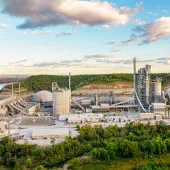CEMEX initiate carbon capture project in Germany

Carbon Clean to work on new ground-breaking carbon capture project at Rüdersdorf cement plant
CEMEX have appointed Carbon Clean to work on a front-end engineering design (FEED) study for a ground-breaking carbon capture project at their Rüdersdorf plant, in Germany, as part of their Carbon Neutral Alliance at the site.
The initial stage of this project will aim to capture 100 tonnes/day of CO2 at the plant and combine this with hydrogen from renewable sources to produce greener synthetic hydrocarbons that can be used in other industries.
The aim then will be to increase the CO2 capture by an additional 300 tonnes/day, and use hydrogen supplied by a dedicated pipeline. Both project stages have already been submitted for national and European funding and expect to be operating by 2026. The receipt of funding is crucial for the implementation of the innovation projects.
Finally, a study will be completed to investigate how to scale up to 2,000 tonnes/day of CO2.
Sergio Menendez, president of CEMEX Europe, Middle East, Africa and Asia, commented: ‘This project with Carbon Clean is the latest development in CEMEX’s plan to achieve carbon neutrality at the Rüdersdorf cement plant by 2030, through our pioneering Carbon Neutral Alliance with expert industrial consortiums. Carbon capture will play a fundamental role in the efforts to succeed in this goal and ensure our operations are more sustainable.’
CEMEX and Carbon Clean are working together with the objective of demonstrating the potential of significantly reducing CO2 capture costs and establishing technology to support this. Last year, the company carried out a feasibility study with Carbon Clean to demonstrate the reduction in CO2 capture cost from the cement plant flue gas with an initial capacity of 100 tonnes/day.
Globally, CEMEX have committed to reduce their CO2 emissions by 35% by 2025 and 40% by 2030, with their European operations being the first to align to the EU’s aspiration to reduce CO2 emissions by 55% by 2030 as part of its ‘Future in Action’ strategy – committed to net-zero CO2.









